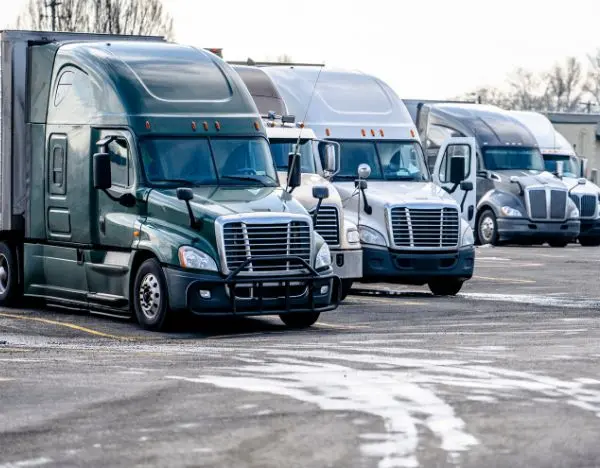Commercial Driver's License (CDL) holders in Buffalo, New York face unique challenges when charged with driving under the influence (DUI). The consequences of a DUI conviction for CDL holders can be particularly severe, potentially jeopardizing their livelihood and career. At Trbovich Law Firm, we understand the intricacies of CDL DUI cases and are committed to providing robust legal representation for commercial drivers facing these charges. Contact us for immediate assistance if you have been charged with DUI while driving your commercial vehicle.
What Constitutes a Buffalo CDL DUI Charge?
A Buffalo CDL DUI charge occurs when a commercial driver's license (CDL) holder is accused of operating a commercial motor vehicle (CMV) with a blood alcohol concentration (BAC) of 0.04% or higher, or while under the influence of drugs. This charge can also apply if a CDL holder operates a non-commercial vehicle with a BAC of 0.08% or higher. The offense must take place within Buffalo or the surrounding areas under New York State jurisdiction.

CDL holders are subject to stricter standards due to the potential dangers of operating large commercial vehicles, and charges can result from traffic stops, accidents, checkpoints, or mandatory post-accident testing. Refusing a chemical test can lead to automatic license suspension. These cases involve both state and federal regulations, potentially affecting a driver's ability to operate in other states and carrying severe consequences for their commercial driving career.
How a Buffalo CDL DUI Lawyer Can Help
At Trbovich Law Firm, we understand the severe consequences CDL holders face when charged with a DUI in Buffalo. Our team of dedicated Buffalo CDL DUI lawyers is committed to protecting your rights, license, and livelihood. Here's how we can help:
CDL DUI Case Evaluation and Strategy Development
We begin by thoroughly evaluating your case, examining the circumstances of the traffic stop, field sobriety tests, chemical test results, and any potential rights violations during arrest. Based on this evaluation, we develop a tailored legal strategy to achieve the best possible outcome for your situation.
Challenging Evidence of Your CDL DUI Charge
As your Buffalo CDL DUI attorney, we meticulously scrutinize all evidence against you. This includes questioning the accuracy of chemical tests, challenging field sobriety tests, examining police reports for inconsistencies, and investigating testing equipment maintenance records. We aim to identify any weaknesses in the prosecution's case that could lead to reduced charges or dismissal.
Negotiating with Prosecutors on Your CDL DUI Case
Our Buffalo CDL DUI lawyers leverage their experience and knowledge of local courts to negotiate for reduced charges, alternative sentencing options, and outcomes that minimize the impact on your CDL status. We aim to resolve your case to best preserve your ability to continue your career as a commercial driver.
Representing You in DUI Court
If your case goes to trial, you can count on robust representation from Trbovich Law Firm. We present compelling arguments in your defense, cross-examine prosecution witnesses, challenge evidence admissibility, and ensure your rights are protected throughout the proceedings.
Handling Administrative Hearings
We represent you in Department of Motor Vehicles administrative hearings to contest license suspensions, argue for limited driving privileges, and ensure all proper procedures are followed. Our goal is to minimize disruptions to your ability to work and drive.
Mitigating CDL DUI Charge Consequences
Even when a conviction cannot be avoided, we work to mitigate the consequences by advocating for minimal fines, seeking alternatives to jail time, negotiating for the shortest possible license suspension period, and helping you understand and comply with court-ordered requirements.
Guiding You Through the DUI Legal Process
We provide guidance every step of the way, explaining your rights and legal options, keeping you informed about your case's progress, advising on interactions with law enforcement and the court system, and helping you prepare for various potential outcomes.
Assisting with CDL License Reinstatement
If your license is suspended, we help you navigate the process by ensuring you meet all court-ordered requirements, assisting with necessary paperwork, and representing you in reinstatement hearings.
Addressing CDL Employment Concerns From Your DUI Charge
We advise you on your obligations to report the charge to your employer, help you understand your rights as an employee, and provide guidance on discussing the situation with your employer.
The Consequences of a CDL DUI Conviction in Buffalo
The repercussions of a CDL DUI conviction in Buffalo can be severe and long-lasting. Understanding these potential consequences underscores the importance of securing competent legal representation:
- License Suspension: Your commercial driver's license may be suspended for a minimum of one year for a first offense, and potentially for life for subsequent offenses.
- Employment Implications: Many employers have zero-tolerance policies for DUI convictions, which could result in job loss.
- Financial Penalties: Substantial fines, increased insurance premiums, and potential civil liability can create significant financial strain.
- Criminal Record: A DUI conviction results in a criminal record, which can affect future employment opportunities and other aspects of your life.
- Mandatory Substance Abuse Programs: You may be required to complete alcohol education or treatment programs at your own expense.
- Installation of Ignition Interlock Device: Even after license reinstatement, you may be required to install and maintain an ignition interlock device in your vehicle.
What Are the CDL DUI Laws in New York
New York State has specific laws and regulations for CDL holders accused of driving under the influence. Some key points to understand include:
- Lower Blood Alcohol Concentration (BAC) Limit: While the legal BAC limit for most drivers is 0.08%, CDL holders face a stricter standard of 0.04% when operating a commercial vehicle.
- Implied Consent: Commercial drivers in New York are subject to implied consent laws, which mean they must submit to chemical testing if they are suspected of driving under the influence.
- Disqualification Periods: A first-offense DUI conviction can result in a one-year disqualification from commercial driving. A second offense can lead to a lifetime ban.
- Impact on Personal License: A DUI conviction can affect a CDL holder's commercial and personal driving privileges.
- Out-of-State Convictions: DUI convictions from other states can impact a New York CDL holder's driving privileges.
Potential Legal Defenses in CDL DUI Cases
Each CDL DUI case is unique, and the appropriate defense strategy depends on the specific circumstances. However, some common defenses that a Buffalo CDL DUI lawyer might employ include:
- Challenging the Initial Stop: If the police officer did not have reasonable suspicion to initiate the traffic stop, it may be possible to have the case dismissed.
- Questioning Field Sobriety Tests: These tests can be subjective and may not accurately indicate impairment, especially for individuals with certain medical conditions or physical limitations.
- Contesting Chemical Test Results: Breathalyzer and blood tests can be inaccurate due to improper administration, equipment malfunction, or other factors.
- Arguing Rising Blood Alcohol: In some cases, a driver's BAC may have been below the legal limit while driving but rose above it by the time testing occurred.
- Presenting Alternative Explanations: Some medical conditions or medications can mimic signs of intoxication or affect chemical test results.
Why Choose Trbovich Law Firm for Your Buffalo CDL DUI Case?
At Trbovich Law Firm, we understand the unique challenges faced by CDL holders charged with DUI in Buffalo. Our approach to CDL DUI cases is characterized by:
- In-depth Knowledge: We stay current with the latest developments in CDL DUI law, ensuring that our clients receive up-to-date legal advice and representation.
- Personalized Attention: We recognize that each case is unique and tailor our legal strategies to the specific circumstances of your situation.
- Extensive Experience: Our firm has a long history of handling CDL DUI cases in Buffalo, giving us valuable insights into local court procedures and tendencies.
- Comprehensive Support: We guide you through every step of the legal process, from initial consultation to final resolution, ensuring you understand your rights and options at each stage.
- Commitment to Results: Our primary goal is to achieve the best possible outcome for your case, whether that means reducing charges, securing an acquittal, or negotiating favorable plea terms.
Steps to Take if Charged with a CDL DUI in Buffalo
Taking prompt action is crucial if you face CDL DUI charges in Buffalo. Here are some immediate steps to consider:
- Exercise Your Right to Remain Silent: Avoid making statements to law enforcement without legal counsel present.
- Document the Incident: Write down everything you remember about the traffic stop and arrest immediately.
- Gather Information: Collect contact information for any witnesses who may have observed the events leading to your arrest.
- Preserve Evidence: Keep any relevant documents, such as the citation or arrest report.
- Contact a Buffalo CDL DUI Lawyer: Reach out to Trbovich Law Firm as soon as possible to begin building your defense.
Protect Your CDL and Your Future
If you're facing a CDL DUI charge in Buffalo, don't wait to get help. At Trbovich Law Firm, we understand the complexities of CDL DUI cases and the potential impact on your career. Contact us today for a confidential consultation. Let our experienced Buffalo CDL DUI lawyers fight for your rights and work to protect your commercial driving future.
Buffalo CDL DUI Lawyer FAQs
How soon after a CDL DUI arrest should I contact a lawyer?
Contact a Buffalo CDL DUI lawyer as soon as possible after your arrest. Quick action allows your attorney to gather fresh evidence, speak with witnesses while their memories are clear, and ensure you don't miss any critical deadlines in your case.
Can I represent myself in a CDL DUI case?
While you have the right to represent yourself, it's not advisable in CDL DUI cases. These cases involve complex legal and technical issues requiring specific knowledge of state and federal regulations. A Buffalo DUI lawyer near me can navigate these complexities more effectively.
How long does a CDL DUI case typically take to resolve?
The duration of a CDL DUI case can vary widely depending on the specifics of your situation. Some cases may be resolved in a few months, while others could take a year or more if they go to trial. Your Buffalo CDL DUI lawyer can give you a more accurate timeline based on the details of your case.
Will I lose my job immediately if charged with a CDL DUI?
Not necessarily. While some employers have zero-tolerance policies, others may wait for the case's outcome before making employment decisions. Your Buffalo CDL DUI lawyer can advise you on how to handle the situation with your employer and potentially help mitigate employment consequences.
Are there any alternatives to a CDL DUI conviction?
Depending on the circumstances of your case, there may be alternatives such as plea bargains to lesser charges or diversion programs. A skilled Buffalo CDL DUI lawyer can explore these options and advocate for the best possible outcome in your situation.
How does a CDL DUI charge affect my insurance rates?
A CDL DUI conviction often leads to significantly higher insurance premiums, both for personal and commercial policies. In some cases, insurers may even cancel your policy. Your Buffalo CDL DUI lawyer can advise on strategies to minimize these impacts.
Can I get a restricted license to continue working while my case is pending?
In some situations, obtaining a restricted license that allows you to continue working in a limited capacity may be possible. Your Buffalo CDL DUI lawyer can help you understand if this is an option in your case and guide you through applying for such a license.
What if I'm from out of state but got a CDL DUI in Buffalo?
If you're an out-of-state driver charged with a CDL DUI in Buffalo, you must address the charge in New York. However, your home state will also be notified and may impose its own penalties. A Buffalo CDL DUI lawyer can represent you locally and advise on potential out-of-state consequences.
How can I prevent a CDL DUI charge in the future?
The best prevention is to never drive under the influence. However, your Buffalo CDL DUI lawyer can guide CDL holders on best practices, including understanding your rights during traffic stops and the importance of regular self-testing with personal breathalyzers.
What sets Trbovich Law Firm apart in handling CDL DUI cases?
At Trbovich Law Firm, we understand the unique challenges faced by CDL holders. Our Buffalo DUI lawyers stay current with state and federal regulations affecting commercial drivers. We provide personalized attention to each case, leveraging our experience with local courts and prosecutors to fight for the best possible outcomes for our clients.


